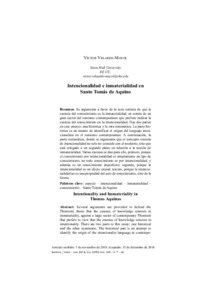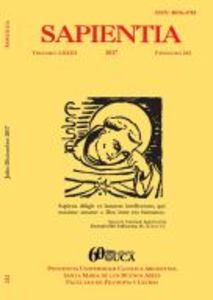Por favor, use este identificador para citar o enlazar este ítem:
https://repositorio.uca.edu.ar/handle/123456789/9665| Título: | Intencionalidad e inmaterialidad en Santo Tomás de Aquino Intentionality and Immateriality in Thomas Aquinas |
Autor: | Velarde Mayol, Víctor | Palabras clave: | INTENCIONALIDAD; CONOCIMIENTO; TOMISMO; ABSTRACCION; GNOSEOLOGIA | Fecha de publicación: | 2018 | Editorial: | Pontificia Universidad Católica Argentina. Facultad de Filosofía y Letras | Cita: | Velarde Mayol, V. Intencionalidad e inmaterialidad en Santo Tomás de Aquino [en línea]. Sapientia. 2018, 74(243). Disponible en: https://repositorio.uca.edu.ar/handle/123456789/9665 | Resumen: | Resumen: Se argumenta a favor de la tesis tomista de que la esencia del conocimiento es la inmaterialidad, en contra de un gran sector del tomismo contemporáneo que prefiere radicar la esencia del conocimiento en la intencionalidad. Hay dos partes en este ensayo: una histórica y la otra sistemática. La parte histórica es un intento de identificar el origen del lenguaje intencionalista en el tomismo contemporáneo. A continuación, la
parte sistemática, donde se argumenta que el concepto tomista de intencionalidad no solo no coincide con el moderno, sino que está relegado a un segundo plano en relación a la noción de inmaterialidad. Varias razones se dan para ello, primero, porque el conocimiento por intencionalidad es simplemente un tipo de conocimiento, no todo conocimiento es por intencionalidad, y además es un conocimiento imperfecto; segundo, porque la
intencionalidad es un efecto causal; tercero, porque la intencionalidad no es una propiedad del acto de conocimiento, sino de la forma. Abstract: Several arguments are provided to defend the Thomistic thesis that the essence of knowledge consists in immateriality, against a large sector of contemporary Thomism that prefers to view that the essence of knowledge consists in intentionality. There are two parts to this essay: one historical and the other systematic. The historical part is an attempt to identify the origin of the intentionalist language in contemporary Thomism. It is followed by the systematic part, where it is argued that the Thomistic concept of intentionality not only does not coincide with the modern one, but is relegated to the background in relation to the notion of immateriality. Several reasons are given for this, first, because knowledge by intentionality is simply a type of knowledge, not all knowledge is by intentionality, and, in addition to this, is an imperfect knowledge; second because intentionality is a causal effect; third, because intentionality is not a property of the act of knowledge, but of the form. |
URI: | https://repositorio.uca.edu.ar/handle/123456789/9665 | ISSN: | 0036-4703 (impreso) 0036-4703 (on line) |
Disciplina: | FILOSOFIA | Derechos: | Acceso abierto | Fuente: | Sapientia. 2018, 74(243) |
| Aparece en las colecciones: | SAP - 2018 Vol LXXIV nro. 243 |
Ficheros en este ítem:
| Fichero | Descripción | Tamaño | Formato | |
|---|---|---|---|---|
| intencionalidad-inmaterialidad-tomas.pdf | 198,85 kB | Adobe PDF |  Visualizar/Abrir | |
| Sapientia243.jpg | 5,57 kB | JPEG |  Visualizar/Abrir |
Visualizaciones de página(s)
142
comprobado en 30-abr-2024
Descarga(s)
1.042
comprobado en 30-abr-2024
Google ScholarTM
Ver en Google Scholar
Este ítem está sujeto a una Licencia Creative Commons

